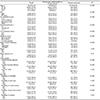References
2. Ligibel JA, Denlinger CS. New NCCN guidelines for survivorship care. J Natl Compr Canc Netw 2013;115 Suppl. :640–644.
3. Han SS, Shin IS, Kim YJ. Factors that influence quality of life in cancer patients. Korean J Health Promot Dis Prev 2009;9(1):33–40.
4. Mohile SG, Hurria A, Cohen HJ, Rowland JH, Leach CR, Arora NK, et al. Improving the quality of survivorship for older adults with cancer. Cancer 2016;122(16):2459–2568.
5. Annunziata MA, Muzzatti B, Flaiban C, Gipponi K, Carnaghi C, Tralongo P, et al. Long-term quality of life profile in oncology: a comparison between cancer survivors and the general population. Support Care Cancer 2018;26(2):651–656.
6. Kim KI, Soh HS, Min SK. A study on quality of life of cancer patients. J Korean Assoc Soc Psychiatry 2002;7:116–122.
7. Downey L, Engelberg RA. Quality-of-life trajectories at the end of life: assessments over time by patients with and without cancer. J Am Geriatr Soc 2010;58:472–479.
8. Kang IO, Yun YH. Preliminary investigation of the quality of life in the elderly with cancer. J Korean Acad Fam Med 2004;25(9):678–686.
9. Park JA, Hong JY. Factors influencing quality of life in adult cancer patients: the sixth Korea National Health and Nutrition Examination Survey (KNHANES VI-2), 2014. J Korea Acad Ind Coop Soc 2017;18(5):382–390.
10. Lee SI. Validity and reliability evaluation for EQ-5D in Korea Osong: Centers for disease control and prevention; 2011.
11. Miller KD, Triano LR. Medical issues in cancer survivors--a review. Cancer J 2008;14(6):375–387.
12. Gegechkori N, Haines L, Lin JJ. Long-term and latent side effects of specific cancer types. Med Clin North Am 2017;101(6):1053–1073.
13. Yi JC, Syrjala KL. Anxiety and depression in cancer survivors. Med Clin North Am 2017;101(6):1099–1113.
14. Grotmol KS, Lie HC, Hjermstad MJ, Aass N, Currow D, Kaasa S, et al. Depression-a major contributor to poor quality of life in patients with advanced cancer. J Pain Symptom Manage 2017;54(6):889–897.
15. Elwood TW. Old age and the quality of life. Health Serv Rep 1972;87(10):919–931.
16. Lavdaniti M, Zyga S, Vlachou E, Sapountzi-Krepia D. Quality of life in elderly cancer patients undergoing chemotherapy. Adv Exp Med Biol 2017;989:291–295.
17. Rostoft S, Audisio RA. Recent advances in cancer surgery in older patients. F1000Res 2017;6:1242.
18. Lindskog M, Tavelin B, Lundstrom S. Old age as risk indicator for poor end-of-life care quality - a population-based study of cancer deaths from the Swedish Register of Palliative Care. Eur J Cancer 2015;51(10):1331–1339.
19. Lee MK, Kang HS, Lee KS, Lee ES. Three-year prospective cohort study of factors associated with return to work after breast cancer diagnosis. J Occup Rehabil 2017;27(4):547–558.
20. Lee SY, Kim SJ, Shin J, Han KT, Park EC. The impact of job status on quality of life: general population versus long-term cancer survivors. Psychooncology 2015;24(11):1552–1559.
21. Schultz PN, Beck ML, Stava C, Sellin RV. Cancer survivors. Work related issues. AAOHN J 2002;50(5):220–226.
22. de Jong M, Tamminga SJ, Frings-Dresen MH, de Boer AG. Quality of working life of cancer survivors: associations with health- and work-related variables. Support Care Cancer 2017;25(5):1475–1484.
23. Islam T, Dahlui M, Majid HA, Nahar AM, Mohd Taib NA, Su TT. MyBCC study group. Factors associated with return to work of breast cancer survivors: a systematic review. BMC Public Health 2014;14Suppl 3. :S8.
24. Taskila T, Lindbohm ML. Factors affecting cancer survivors' employment and work ability. Acta Oncol 2007;46(4):446–451.
25. Xu RH, Cheung AWL, Wong EL. Examining the health-related quality of life using EQ-5D-5L in patients with four kinds of chronic diseases from specialist outpatient clinics in Hong Kong SAR, China. Patient Prefer Adherence 2017;11:1565–1572.
26. Joshi P, Song HB, Lee SA. Association of chronic disease prevalence and quality of life with suicide-related ideation and suicide attempt among Korean adults. Indian J Psychiatry 2017;59(3):352–358.
27. Pergolotti M, Deal AM, Williams GR, Bryant AL, Bensen JT, Muss HB, et al. Activities, function, and health-related quality of life (HRQOL) of older adults with cancer. J Geriatr Oncol 2017;8(4):249–254.


